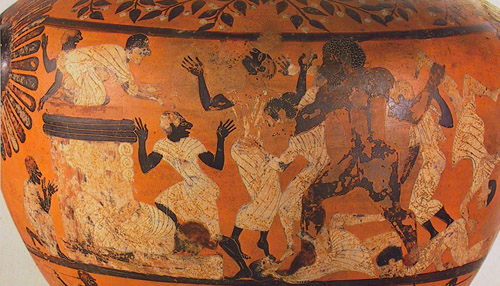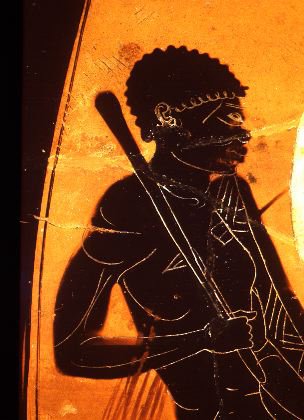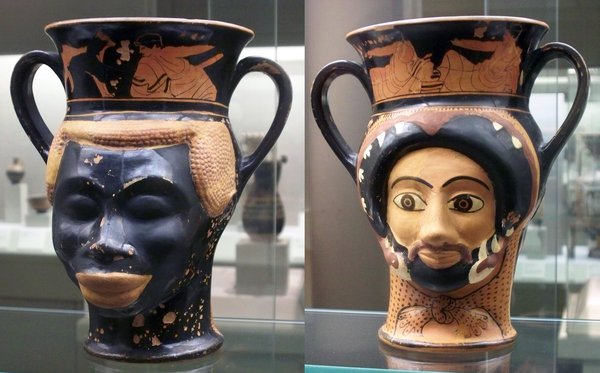It looks like you're using an Ad Blocker.
Please white-list or disable AboveTopSecret.com in your ad-blocking tool.
Thank you.
Some features of ATS will be disabled while you continue to use an ad-blocker.
share:
reply to post by Eniii
It's not just a single piece of evidence that makes me think that way. It's a combination of pieces. The genetic testing of certain mummies, the artwork, and the physical appearance of said mummies.
Not to mention, Egyptians specifically didn't consider themselves "black" in their own descriptions of themselves, at least no initially. That's why I think it started populated with Levant/Anatolian/Mesopotamian/Eritrean admixture and gradually mixed to become more Africanized over time, then the demographics shifted again with the Greek, Roman, and Arab invasions. Their own depiction of "Libyans" is rather revealing as they are depicted as the lightest of the 4 major ethnicities in that region at the time. If you want to see what a BC libyan looks like, look no further than a surviving bust of Hannibal of Carthage.
Hannibal
It's also interesting that you say that about the Olmec. Every piece of Olmec art I have ever seen except for that giant stone head, actually looks more Asian/Native American than anything else.
Olmec Statue
Olmec Mask
Olmec Wrestler
Olmec Mask 2
That famous stone head could look black, but also looks a lot like this:
Mexican Azteca
Famous Stone Head
It's not just a single piece of evidence that makes me think that way. It's a combination of pieces. The genetic testing of certain mummies, the artwork, and the physical appearance of said mummies.
Not to mention, Egyptians specifically didn't consider themselves "black" in their own descriptions of themselves, at least no initially. That's why I think it started populated with Levant/Anatolian/Mesopotamian/Eritrean admixture and gradually mixed to become more Africanized over time, then the demographics shifted again with the Greek, Roman, and Arab invasions. Their own depiction of "Libyans" is rather revealing as they are depicted as the lightest of the 4 major ethnicities in that region at the time. If you want to see what a BC libyan looks like, look no further than a surviving bust of Hannibal of Carthage.
Hannibal
It's also interesting that you say that about the Olmec. Every piece of Olmec art I have ever seen except for that giant stone head, actually looks more Asian/Native American than anything else.
Olmec Statue
Olmec Mask
Olmec Wrestler
Olmec Mask 2
That famous stone head could look black, but also looks a lot like this:
Mexican Azteca
Famous Stone Head
edit on 9-9-2013 by Galvatron because: (no reason given)
edit on 9-9-2013 by Galvatron because: (no reason given)
Galvatron
My understanding is that the older Egyptian Dynasties were filled with people like you would see in Turkey and the Levant. The older mummies genetically test this way, too. Just look at Ramses the II, he had blonde hair. The population started out that way then became more and more Africanized in the later dynasties until the Greek Invasion, then Roman Invasion, then Arab Invasion changed the Demographics to what you see today. Like most nations on earth, demographics rarely stay the same over long periods of time. You can see it in the artwork, too.
Ramses II
Wooden Statue with Blue Eyes
I think the demographics started Anatolian and slowly became more and more Africanized until the series of invasions.
Actually that's the other way around the further back one goes the more they looked like their neighbors
and I am not sure about genetic testing done on old kingdom mummies, would like to check out those results,Ramses is special precisely because he appears so unusual however his dna is known E1b1a or E- M2, a YDNA haplogroup mainly found in Sub-Saharan Africa.
Also be careful of what you think of Anatolian characteristics tropically adapted as well as cold adapted folks were in the area from the earliest of time.
In any case the old dynasties came out of the deep south and this is true for the middle kingdom dynasties as well.
reply to post by Spider879
I think you're referring to Ramses III, who most certainly did have sub-saharan DNA and his mummy definitely looks that way. of the 20th dynasty. The picture I linked is of Ramses II of the 19th dynasty.
I'm unfamiliar beyond that, are they related? Or is it kind of like English monarchs where you can have Edwards and Elizabeths separated by generations and unrelated family?
Edit: Made new post of edit.
I think you're referring to Ramses III, who most certainly did have sub-saharan DNA and his mummy definitely looks that way. of the 20th dynasty. The picture I linked is of Ramses II of the 19th dynasty.
I'm unfamiliar beyond that, are they related? Or is it kind of like English monarchs where you can have Edwards and Elizabeths separated by generations and unrelated family?
Edit: Made new post of edit.
edit on 9-9-2013 by Galvatron because: (no reason given)
Galvatron
reply to post by Spider879
I think you're referring to Ramses III, who most certainly did have sub-saharan DNA and his mummy definitely looks that way. of the 20th dynasty. The picture I linked is of Ramses II of the 19th dynasty.
I'm unfamiliar beyond that, are they related? Or is it kind of like English monarchs where you can have Edwards and Elizabeths separated by generations and unrelated family?
Yes Ramses III but they are of the same dynasty as that was his son.
reply to post by Spider879
The difference between Ramses II and Ramses III would indicate a very open revolving door nobility/hierarchy. And considering Egypt, for much of it's history, was one of THE civilizations, I wouldn't be surprised if it were more or less a melting pot as people flocked to civilization from all over, either through trade, desire, or whatever. Personally, to me, their art depicts themselves looking a lot like modern day Eritreans. especially the red skin tone, but not sub-Saharan African.
Eritrean Woman
The difference between Ramses II and Ramses III would indicate a very open revolving door nobility/hierarchy. And considering Egypt, for much of it's history, was one of THE civilizations, I wouldn't be surprised if it were more or less a melting pot as people flocked to civilization from all over, either through trade, desire, or whatever. Personally, to me, their art depicts themselves looking a lot like modern day Eritreans. especially the red skin tone, but not sub-Saharan African.
Eritrean Woman
edit on 9-9-2013 by Galvatron because: (no reason
given)
reply to post by Galvatron
Yes that has been my position great civilizations attracts folks near and far and I'll say it again the Greeks and the Romans were very multicultural even more so than Kemet as they incorporated much of their known world in a way that Kemet never did,but we all recognize the core population.
And considering Egypt, for much of it's history, was one of THE civilizations, I wouldn't be surprised if it were more or less a melting pot as people flocked to civilization from all over, either through trade, desire, or whatever.
Yes that has been my position great civilizations attracts folks near and far and I'll say it again the Greeks and the Romans were very multicultural even more so than Kemet as they incorporated much of their known world in a way that Kemet never did,but we all recognize the core population.
Galvatron
reply to post by Spider879
The difference between Ramses II and Ramses III would indicate a very open revolving door nobility/hierarchy. And considering Egypt, for much of it's history, was one of THE civilizations, I wouldn't be surprised if it were more or less a melting pot as people flocked to civilization from all over, either through trade, desire, or whatever. Personally, to me, their art depicts themselves looking a lot like modern day Eritreans. especially the red skin tone, but not sub-Saharan African.
Eritrean Womanedit on 9-9-2013 by Galvatron because: (no reason given)
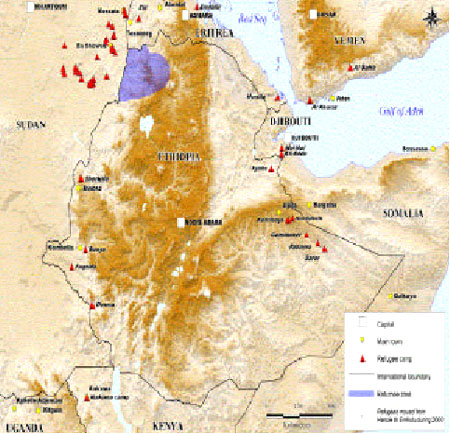
Eritrea is Sub-saharan
Galvatron the problem is many people associate "Sub-Saharan" with certain traits the fact are Africans have diverse phenotype and coloring head shapes and body build without it being a case for non African biological input,although that does occur,for instance the Ibos of Nigeria have the highest cases of freckles out side European population without them being genetically connected to Europeans in any meaning full way.
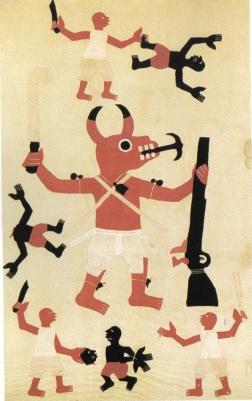
This is how some other Africans view each other this is a battle scene between the Dahomey or Benin and their Yoruba neighbors this scene is reminiscent of Kemetian battle scene with some of their neighbors.
Arrian (Indica 6.9):
"The appearance of the inhabitants is also not very different in India and Ethiopia: the southern Indians are rather more like Ethiopians as they are black to look on, and their hair is black; only they are not so snub-nosed or woolly-haired as the Ethiopians the northern Indians are most like the Egyptians physically"
Strabo
"As for the people of India, those in the south are like the Aethiopians in color, although they are like the rest in respect to countenance and hair (for on account of the humidity of the air their hair does not curl), whereas those in the north are like the Egyptians"
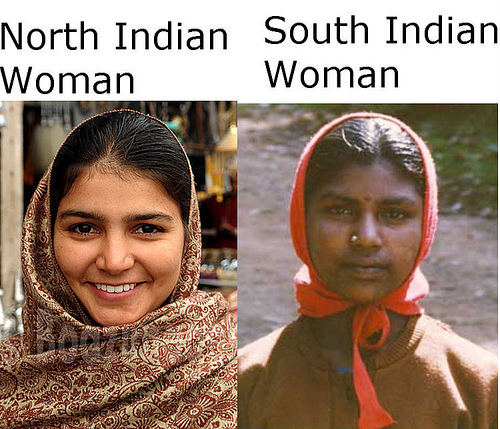
And modern Egyptians, you can see that they do indeed look like north Indians!

"The appearance of the inhabitants is also not very different in India and Ethiopia: the southern Indians are rather more like Ethiopians as they are black to look on, and their hair is black; only they are not so snub-nosed or woolly-haired as the Ethiopians the northern Indians are most like the Egyptians physically"
Strabo
"As for the people of India, those in the south are like the Aethiopians in color, although they are like the rest in respect to countenance and hair (for on account of the humidity of the air their hair does not curl), whereas those in the north are like the Egyptians"

And modern Egyptians, you can see that they do indeed look like north Indians!

edit on 9-9-2013 by LUXUS because: (no reason given)
Several Egyptians told me that in their opinion the Colchians were descended from soldiers of Sesostris. I had conjectured as much myself from two pointers, firstly because they have black (melanchros) skins and kinky hair and secondly, and more reliably for the reason that alone among mankind the Egyptians and the Ethiopians have practiced circumcision since time immemorial
Herodotus the Histories.
Why are Ethiopians and Egyptians bandy-legged? Is it because the bodies of living creatures become distorted by the heat, like logs of wood when they become dry? The condition of their hair supports this theory, for it is curlier than that of other nations, and curliness is as it were, crookedness of the hair
In Aristotle's Physiognomica we find the following(Book 14, Paragraph 4)
"Too black a hue as you see with Egyptians and Ethiopians Or too white a hue as you see with women. A tawny colour signifies courage as you see with lions. It is the intermediate colour. A colour that is too ruddy marks a rogue as you see with foxes"
double.sorry.
edit on 9-9-2013 by Spider879 because: (no reason given)
edit on 9-9-2013 by Spider879 because: (no reason
given)
Spider879
reply to post by LUXUS
Herodotus the Histories.
Several Egyptians told me that in their opinion the Colchians were descended from soldiers of Sesostris. I had conjectured as much myself from two pointers, firstly because they have black (melanchros) skins and kinky hair and secondly, and more reliably for the reason that alone among mankind the Egyptians and the Ethiopians have practiced circumcision since time immemorial
In Aristotle's Physiognomica we find the following(Book 14, Paragraph 4)
Why are Ethiopians and Egyptians bandy-legged? Is it because the bodies of living creatures become distorted by the heat, like logs of wood when they become dry? The condition of their hair supports this theory, for it is curlier than that of other nations, and curliness is as it were, crookedness of the hair
AMASIS
"Too black a hue as you see with Egyptians and Ethiopians Or too white a hue as you see with women. A tawny colour signifies courage as you see with lions. It is the intermediate colour. A colour that is too ruddy marks a rogue as you see with foxes"
Ethiopians here is a reference to Kush and not the highland Ethiopians that later became Axum.
Kantharos (cup) of Herakles and African man (possibly Egyptian King Busiris); Greek, Attic; circa 470 BCE; terracotta
Yes I know this image is shocking to many but that's how the Greek saw many of them with that so called Sub-Saharan look.

Egyptian kids up country.
This is nothing but black supremacist hogwash. I've heard it all before, I've even heard claims from various "Afrocentric" website that "Vikings
were black". I'm not even kidding you. It's idiotic. Egyptians were not black, nor were they white. They were simply Arabians. I believe one
culture (the black culture) is trying to simply steal another culture/achievements simply due to the lack of black culture during this era.
Blacks weren't the only ones who were told their ancestors were savages. My recent ancestry is European (German). I've been told since I was a little boy that Germans were blood thirsty savages that would rather chop my head off than talk to me.
In summary, this thread is nonsense. Quit trying to steal another cultures achievements simply because they made some great history. There's nothing wrong with black history, even back then. Heck, during this point in time, Europeans were living in the forest scared of monsters and witches. As a friend of mine likes to say, "deal with it".
Blacks weren't the only ones who were told their ancestors were savages. My recent ancestry is European (German). I've been told since I was a little boy that Germans were blood thirsty savages that would rather chop my head off than talk to me.
In summary, this thread is nonsense. Quit trying to steal another cultures achievements simply because they made some great history. There's nothing wrong with black history, even back then. Heck, during this point in time, Europeans were living in the forest scared of monsters and witches. As a friend of mine likes to say, "deal with it".
Auricom
This is nothing but black supremacist hogwash. I've heard it all before, I've even heard claims from various "Afrocentric" website that "Vikings were black". I'm not even kidding you. It's idiotic. Egyptians were not black, nor were they white. They were simply Arabians. I believe one culture (the black culture) is trying to simply steal another culture/achievements simply due to the lack of black culture during this era.
Blacks weren't the only ones who were told their ancestors were savages. My recent ancestry is European (German). I've been told since I was a little boy that Germans were blood thirsty savages that would rather chop my head off than talk to me.
In summary, this thread is nonsense. Quit trying to steal another cultures achievements simply because they made some great history. There's nothing wrong with black history, even back then. Heck, during this point in time, Europeans were living in the forest scared of monsters and witches. As a friend of mine likes to say, "deal with it".
If you want to deal with black Vikings then go a head this thread has nothing to do with that,and what is hogwash about Kemetians being black and Africans... it's in AFRICA!!..they were not Arabs I have no idea why people keep saying that, no anthropologist/archaeologist agrees with that, and Arabs are a language group the problem is people try to take Egypt out of it's African context when Africans or people of African decent confront you on your B/S you start crying why is that??,that's the hogwash..
Egypt in its African Context
Proceedings of the conference held at The Manchester Museum
,University of Manchester,
2-4 October 2009
Then came King Elephant
Today it is accepted that the formation of Egyptiancivilisation originated in the expansion of the Naqadancultures of Upper Egypt, which subsumed the originalcultures of the Delta (Maadi-Buto). In this paper I will not bediscussing the continuous interaction with the cultures of theUpper Egypt until its ‘naqadisation’, or the complexrelations between Predynastic Egypt and the cultures of the Near East. The southern Naqadan polities traded with thenorthern polities of the Delta from the time of King Elephant – the burial of an elephant at Nekhen/Hierakonpolisdating to
c.
3600 BC – and imported Maadi jars as wellas Nubian artefacts (Friedman 2003a). I will instead bediscussing the links, as historically constituted, of Egyptwith its African hinterland from the first kingdoms,revealed through the excavations of Michael Hoffman,Barbara Adams and Renée Friedman over the last thirtyyears at Nekhen/Hierakonpolis. In placing the kingdomof Nekhen in the context of its African hinterland, we cansee that the place where King Elephant was buriedemerged at this period from the Badarian cultural background (
c
. 4400-4000 BC) of the Nile Valley and theWestern Saharan pool of cultures (
www.academia.edu...
Don't like black people telling you this??..Ok listen to white folks since only they know the truth..klik the link and deny yourself some Ignorance.
edit on 9-9-2013 by Spider879 because: (no reason given)
edit on 9-9-2013 by Spider879 because: (no reason
given)
reply to post by Spider879
I know what you are getting at. I think I may have to clarify what I meant. There is supposedly a distinct genetic difference between between Eurasians and black Africans. So when I say sub-Saharan African's I meant black Africans. Apparently this difference genetic difference depends on whether or not a population has measurable amounts of Neanderthal DNA. For Eurasians, populations typically share more or less 2 to 6 % Neanderthal DNA while black Africans have 0.1 to 0.0%. What makes this significant is that means in some instances certain populations are actually closer, genetically, to Neanderthals, than they are to black Africans. What's interesting is that there also seems to be a linguistic frontier that more or less falls in line with the genetic frontier plotted over geography. Geographically Eritrea is sub-Saharan, but culturally, genetically, and linguistically, they share little in common with black Africans. I've worked private security for a firm over in the Eritrea/Djibouti area, and the interesting thing about it was that it felt distinctly Arab compared to Sudan. They also don't consider themselves to be black Africans either. The major languages in that region also belong to the Semitic group. The above includes some Ethiopian populations, and some Somali populations that, dark though they may be, aren't genetically black African.
I guess what I'm trying to get at is this. Were ancient Egyptians African? By geographic definition absolutely. Were they linguistically African? By definition absolutely because their language developed on the African continent. The Language itself, however, belongs to the Afro-Asiatic language group which is historically not a black African language group. This is part of the reason why I think the Ancient Egyptian society started out more or less Eurasian, became more or less black African, then after the Greek, Roman, and Arab Invasions, became Eurasian again. Look at Khephren. Not black African. Menkare , could pass for black African, but his queen is the giveaway. Userkaf , looks a lot like Kevin Spacey to me. These are some of the older guys. Were there black Pharaohs? It certainly looks that way. Were there white Pharaohs? It certainly looks that way. Were there Pharaohs in between? it certainly looks that way.
It just seems to me that the evidence suggests that Egypt wasn't a homogenous black African society, like Afro-centrists sometimes argue. It also seems more likely to me based on the look of the older pharaohs as well as the language family, that ancient Egyptian society started out more or less Eurasian.
Keep in mind, too, that your presentation of Greek descriptions of Egyptians as black Africans were of Egyptians late in their society, not early, which seems to fit my perception of Egypt's changing demographics.
I know what you are getting at. I think I may have to clarify what I meant. There is supposedly a distinct genetic difference between between Eurasians and black Africans. So when I say sub-Saharan African's I meant black Africans. Apparently this difference genetic difference depends on whether or not a population has measurable amounts of Neanderthal DNA. For Eurasians, populations typically share more or less 2 to 6 % Neanderthal DNA while black Africans have 0.1 to 0.0%. What makes this significant is that means in some instances certain populations are actually closer, genetically, to Neanderthals, than they are to black Africans. What's interesting is that there also seems to be a linguistic frontier that more or less falls in line with the genetic frontier plotted over geography. Geographically Eritrea is sub-Saharan, but culturally, genetically, and linguistically, they share little in common with black Africans. I've worked private security for a firm over in the Eritrea/Djibouti area, and the interesting thing about it was that it felt distinctly Arab compared to Sudan. They also don't consider themselves to be black Africans either. The major languages in that region also belong to the Semitic group. The above includes some Ethiopian populations, and some Somali populations that, dark though they may be, aren't genetically black African.
I guess what I'm trying to get at is this. Were ancient Egyptians African? By geographic definition absolutely. Were they linguistically African? By definition absolutely because their language developed on the African continent. The Language itself, however, belongs to the Afro-Asiatic language group which is historically not a black African language group. This is part of the reason why I think the Ancient Egyptian society started out more or less Eurasian, became more or less black African, then after the Greek, Roman, and Arab Invasions, became Eurasian again. Look at Khephren. Not black African. Menkare , could pass for black African, but his queen is the giveaway. Userkaf , looks a lot like Kevin Spacey to me. These are some of the older guys. Were there black Pharaohs? It certainly looks that way. Were there white Pharaohs? It certainly looks that way. Were there Pharaohs in between? it certainly looks that way.
It just seems to me that the evidence suggests that Egypt wasn't a homogenous black African society, like Afro-centrists sometimes argue. It also seems more likely to me based on the look of the older pharaohs as well as the language family, that ancient Egyptian society started out more or less Eurasian.
Keep in mind, too, that your presentation of Greek descriptions of Egyptians as black Africans were of Egyptians late in their society, not early, which seems to fit my perception of Egypt's changing demographics.
edit on 9-9-2013 by Galvatron because: Spelling and added sentence at the
end.
edit on 9-9-2013 by Galvatron because: (no reason given)
reply to post by Galvatron
Linguistically they are part of the Afrasian language family as you said but Afrasian was developed in Africa
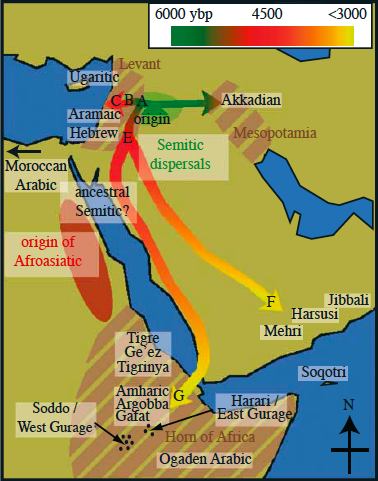
In other words this group of speakers spread from East Africa to areas outside Africa proper.
Shomarka Omar Yahya M.D., DPhil., née Jon Derryll Walker, is an African American physician and anthropologist. He is affiliated with the National Human Genome Center of Howard University and the Department of Anthropology of the Smithsonian Institution. He has been interested in the origins of the concepts of race, the misconception of human variation as race, and the scientific approaches to the biocultural origins and histories of indigenous African peoples.
If can follow the rest of the video lecture very informative.
This is were many get into trouble certain features may not look like other Africans but in fact were developed in Africa,as was said in hot dry areas this is called local evolution and ironically it is the broad faced Bantu of the coast that carries significant Eurasian Dna rather than Somalians.
The fact that present day Somalia and Eritrea have an Arabic feel may be due to similar environments across the Red Sea however that may only be partially be true because the area also shares deep cultural roots with the Sahara and the Great Lakes region of central Africa I tried to explain here.
www.abovetopsecret.com...
Geographically Eritrea is sub-Saharan, but culturally, genetically, and linguistically, they share little in common with black Africans.
Linguistically they are part of the Afrasian language family as you said but Afrasian was developed in Africa
Afrasian languages
Family of about 250 languages spoken in North Africa, parts of sub-Saharan African, and the Middle East. It includes such languages as Arabic, Hebrew, Amharic, and Hausa. The total number of speakers is estimated to be more than 250 million. The major branches of Afro-Asiatic are Semitic, Berber, Egyptian, Cu#ic, Omotic, and Chadic. Berber languages are spoken by perhaps 15 million people in enclaves scattered across North Africa from Morocco to northwestern Egypt and in parts of the western Sahara. Cu#ic consists of some 30 languages spoken by more than 30 million people in northeastern Sudan, Eritrea, Ethiopia, Somalia, Djibouti, Kenya, and a few areas of northeastern Tanzania.
Christopher Ehret:
Ancient Egyptian civilization was, in ways and to an extent usually not recognized, fundamentally African. The evidence of both language and culture reveals these African roots.
The origins of Egyptian ethnicity lay in the areas south of Egypt. The ancient Egyptian language belonged to the Afrasian family (also called Afroasiatic or, formerly, Hamito-Semitic). The speakers of the earliest Afrasian languages, according to recent studies, were a set of peoples whose lands between 15,000 and 13,000 B.C. stretched from Nubia in the west to far northern Somalia in the east. They supported themselves by gathering wild grains. The first elements of Egyptian culture were laid down two thousand years later, between 12,000 and 10,000 B.C., when some of these Afrasian communities expanded northward into Egypt, bringing with them a language directly ancestral to ancient Egyptian. They also introduced to Egypt the idea of using wild grains as food.
A new religion came with them as well. Its central tenet explains the often localized origins of later Egyptian gods: the earliest Afrasians were, properly speaking, neither monotheistic nor polytheistic. Instead, each local community, comprising a clan or a group of related clans, had its own distinct deity and centered its religious observances on that deity. This belief system persists today among several Afrasian peoples of far southwest Ethiopia. And as Biblical scholars have shown, Yahweh, god of the ancient Hebrews, an Afrasian people of the Semitic group, was originally also such a deity. The connection of many of Egypt's predynastic gods to particular localities is surely a modified version of this early Afrasian belief. Political unification in the late fourth millennium brought the Egyptian deities together in a new polytheistic system. But their local origins remain amply apparent in the records that have come down to us.

In other words this group of speakers spread from East Africa to areas outside Africa proper.
Shomarka Omar Yahya M.D., DPhil., née Jon Derryll Walker, is an African American physician and anthropologist. He is affiliated with the National Human Genome Center of Howard University and the Department of Anthropology of the Smithsonian Institution. He has been interested in the origins of the concepts of race, the misconception of human variation as race, and the scientific approaches to the biocultural origins and histories of indigenous African peoples.
If can follow the rest of the video lecture very informative.
The Language itself, however, belongs to the Afro-Asiatic language group which is historically not a black African language group
This is were many get into trouble certain features may not look like other Africans but in fact were developed in Africa,as was said in hot dry areas this is called local evolution and ironically it is the broad faced Bantu of the coast that carries significant Eurasian Dna rather than Somalians.
The fact that present day Somalia and Eritrea have an Arabic feel may be due to similar environments across the Red Sea however that may only be partially be true because the area also shares deep cultural roots with the Sahara and the Great Lakes region of central Africa I tried to explain here.
www.abovetopsecret.com...
reply to post by kimish
" Upset that Hans crushed my dreams?"
I was being funny with that last comment in case you didn't notice, Dream? What is this a Disney production come on man.
I simply found a YouTube video, put it up here and commented it. You guys are taking things too seriously, really.
In this world we live in, hopes are for religious people still waiting for jesus to come make things right.
This is just a forum not real life and we come here to discuss things, learn new things wether they are true or not, find distractions from our daily routines etc.
People whom actually do know everything at out there giving lectures, doing research not wasting time commenting on everything put up on sites like this.
Some people have life's outside of this place and good life's at that.
You are hilarious young man, hilarious.
BTW. Thank for contributing everyone, this thing has gotten way more attention than I had expected since it was only something I randomly found of YouTube and not one of those lecture type presentations some of our ATS colleagues make.
" Upset that Hans crushed my dreams?"
I was being funny with that last comment in case you didn't notice, Dream? What is this a Disney production come on man.
I simply found a YouTube video, put it up here and commented it. You guys are taking things too seriously, really.
In this world we live in, hopes are for religious people still waiting for jesus to come make things right.
This is just a forum not real life and we come here to discuss things, learn new things wether they are true or not, find distractions from our daily routines etc.
People whom actually do know everything at out there giving lectures, doing research not wasting time commenting on everything put up on sites like this.
Some people have life's outside of this place and good life's at that.
You are hilarious young man, hilarious.
BTW. Thank for contributing everyone, this thing has gotten way more attention than I had expected since it was only something I randomly found of YouTube and not one of those lecture type presentations some of our ATS colleagues make.
edit on 10-9-2013 by Eniii because: (no reason given)
edit on 10-9-2013 by Eniii because: (no reason given)
Eniii
reply to post by kimish
" Upset that Hans crushed my dreams?"
I was being funny with that last comment in case you didn't notice, Dream? What is this a Disney production come on man.
I simply found a YouTube video, put it up here and commented it. You guys are taking things too seriously, really.
In this world we live in, hopes are for religious people still waiting for jesus to come make things right.
This is just a forum not real life and we come here to discuss things, learn new things wether they are true or not, find distractions from our daily routines etc.
People whom actually do know everything ( and i dont mean Hanslune) are out there giving lectures, doing research, working on these sites.
They dont have time to be in here posting threads or commenting on everything put up on sites like this. Some people have life's outside of this place and good life's at that, we don't have time to be in here taking everything personally or actually caring about what someone hiding behind a cool avatar writes.
You are hilarious young man, hilarious.
BTW. Thank for contributing everyone, this thing has gotten way more attention than I had expected.
I should make a sequel or something : )
reply to post by Spider879
To that, I repeat.
I haven't seen any credible evidence that the Bantu people have significant levels of Eurasian DNA. In fact quite the opposite. The genetic evidence in the thread you linked are from sources that have mixed reputations and more importantly, agendas. Rather, most evidence I see suggests that Eurasians have significant black African DNA, but not the other way around. Black Africans have almost no Eurasian DNA. Some Somali populations, some Ethiopian populations, Northern Sudan, Eritrea, Djibouti, all "sub-Saharan", but not "black African". I'll try and find some of the stuff I've read that makes me of the opinion that I am.
Heres one:
www.sciencedirect.com...
Current evidence does not convince me that early ancient Egyptian society was a homogenous black African society and became more Semitic, but rather that it started rather Semitic, became a strong black admixture, then became Semitic again, all the while being the great regional power that it was, people from all over came and went as well.
To me, the biggest trouble about the amgibuity of this whole area is that it encompasses the frontier (not necessarily boundary) where the major genetic differences in people occur.
Some of the conflicting evidence, especially among mummy DNA makes me think of Baibars, the great Mamluk Sultan of Egypt. To put it briefly, he was basically what one would describe as Blonde Ukrainian. He was captured into slavery from the Black Sea region at a young age by the Turks, and sold to an Egyptian noble who made him a Mamluk. Baibars, over a career of successful military campaigns basically rose to the position of Sultan through political and military victory. I can't help but think about what an adventure that entire life must have been. If Baibars corpse were discovered some 2000 years from now, it would confuse the hell out of archaeologists and anthropologists.
Spider879
Linguistically they are part of the Afrasian language family as you said but Afrasian was developed in Africa
To that, I repeat.
Galvatron
Were they linguistically African? By definition absolutely because their language developed on the African continent.
I haven't seen any credible evidence that the Bantu people have significant levels of Eurasian DNA. In fact quite the opposite. The genetic evidence in the thread you linked are from sources that have mixed reputations and more importantly, agendas. Rather, most evidence I see suggests that Eurasians have significant black African DNA, but not the other way around. Black Africans have almost no Eurasian DNA. Some Somali populations, some Ethiopian populations, Northern Sudan, Eritrea, Djibouti, all "sub-Saharan", but not "black African". I'll try and find some of the stuff I've read that makes me of the opinion that I am.
Heres one:
www.sciencedirect.com...
Current evidence does not convince me that early ancient Egyptian society was a homogenous black African society and became more Semitic, but rather that it started rather Semitic, became a strong black admixture, then became Semitic again, all the while being the great regional power that it was, people from all over came and went as well.
To me, the biggest trouble about the amgibuity of this whole area is that it encompasses the frontier (not necessarily boundary) where the major genetic differences in people occur.
Some of the conflicting evidence, especially among mummy DNA makes me think of Baibars, the great Mamluk Sultan of Egypt. To put it briefly, he was basically what one would describe as Blonde Ukrainian. He was captured into slavery from the Black Sea region at a young age by the Turks, and sold to an Egyptian noble who made him a Mamluk. Baibars, over a career of successful military campaigns basically rose to the position of Sultan through political and military victory. I can't help but think about what an adventure that entire life must have been. If Baibars corpse were discovered some 2000 years from now, it would confuse the hell out of archaeologists and anthropologists.
edit on 10-9-2013 by Galvatron because: (no
reason given)
Description of Colchians:
"Colchians are large and corpulent in body. Neither joint nor vein is evident. They have a yellow
flesh, as if victims of jaundice" (Hippocrates, Airs, Waters, Places 15)
"Colchis appears as the first Caucasian State to have achieved the coalescence of the newcomer. Colchis can be justly regarded as not a proto-Georgian, but a Georgian (West Georgian) kingdom. . . .It would seem natural to seek the beginnings of Georgian social history in Colchis, the earliest Georgian formation."
en.wikipedia.org...
"Studies of human genetics suggest that Georgians have the highest percentage of Haplogroup G among the general population recorded in any country.[39] Georgians' Y-DNA also belongs to Haplogroup J2, also found in Greece and Italy."
en.wikipedia.org...
Colchians are NOT black, they are Caucasians!

"Colchians are large and corpulent in body. Neither joint nor vein is evident. They have a yellow
flesh, as if victims of jaundice" (Hippocrates, Airs, Waters, Places 15)
"Colchis appears as the first Caucasian State to have achieved the coalescence of the newcomer. Colchis can be justly regarded as not a proto-Georgian, but a Georgian (West Georgian) kingdom. . . .It would seem natural to seek the beginnings of Georgian social history in Colchis, the earliest Georgian formation."
en.wikipedia.org...
"Studies of human genetics suggest that Georgians have the highest percentage of Haplogroup G among the general population recorded in any country.[39] Georgians' Y-DNA also belongs to Haplogroup J2, also found in Greece and Italy."
en.wikipedia.org...
Colchians are NOT black, they are Caucasians!

edit on 10-9-2013 by LUXUS because: (no reason given)
reply to post by LUXUS
Aaaaah there is no such thing as a people called Colchians today,and Spider did not make up the quote that the Colchians were Black Herodotus and others did.. the others being.St Jerome and Sepheronius.
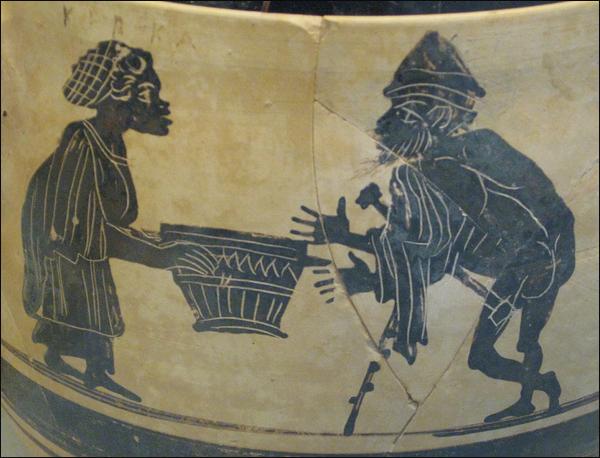
Kirke, Daughter of the Sun
Kirke (Circe) is the daughter of Helios (the Sun) and the Okeanid, Perseis, which would make her the grand-daughter of Okeanos (Ocean). Kirke was also the sister of king Aietes (Aeetes) of Kolchis (Colchis).
On her island ... in her palace ... Kirke waits for lost sailors to come wandering to her door as supplicants. Normally, a traveler is treated as a special guest but with Kirke, travelers are drugged and turned into animals to serve her as she sees fit.
Again don't blame Spider for this blame those damned Afrocentric Greeks.
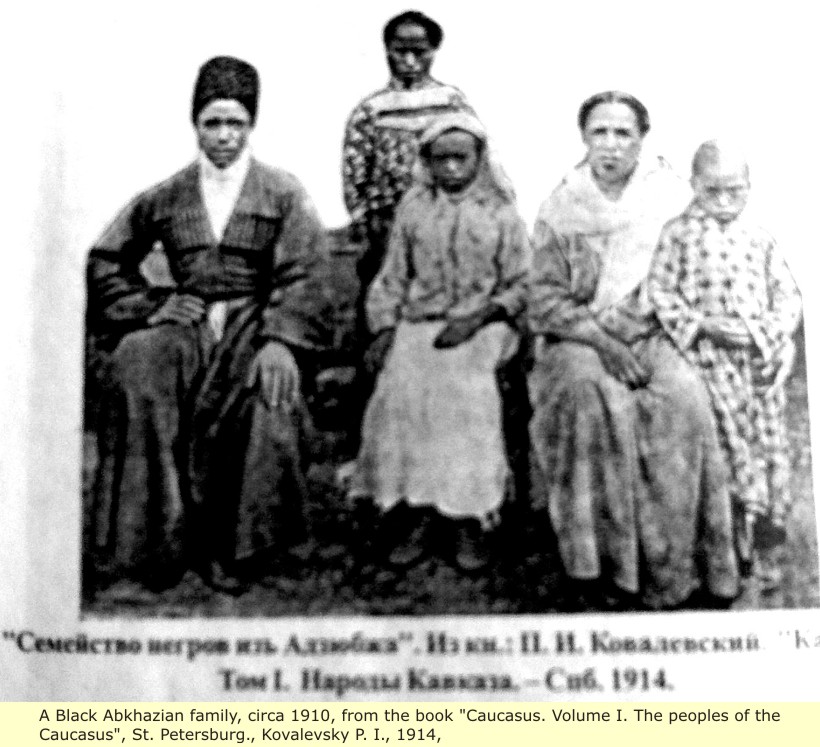
Abhazian family
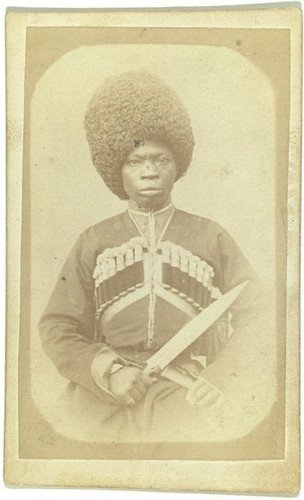
Intimidating Abhazian Black dude with very big knife
Read carefully...I am not saying the above are descendants of the folks Herodotus or St Jerome and Sophronius of Jerusalem saw in the area more likely they came with the Turks as slave soldiers,the point being made is there are reports of African looking folks there since the time of the Greeks whether high yella or black.
And yes off course Georgians are not Blacks any community of Blacks would in time be absorbed as they are not native to the area that's why their presence seemed remarkable.
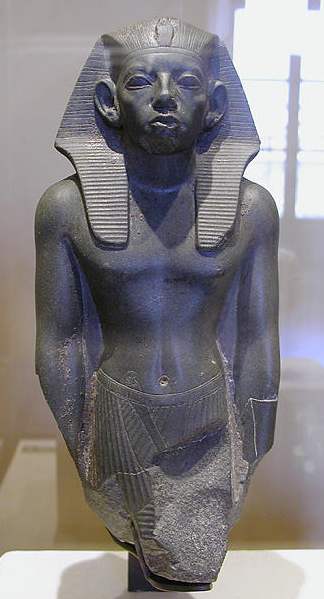
The first penetration of the Black sea area was supposedly done in the 12th dyansty. during the reign of Senusret III and Amenemhet III (Memmon..??) who came from the boarder lands of upper kemet proper and the lands of the Nahasu.
www.reshafim.org.il...
Aaaaah there is no such thing as a people called Colchians today,and Spider did not make up the quote that the Colchians were Black Herodotus and others did.. the others being.St Jerome and Sepheronius.
In the late 4th century, Church Fathers St Jerome and Sophronius, wrote of Colchis as the "second Ethiopia" because of its black population.
Two hundred years later, Sophronius, patriarch of Jerusalem, described an "Ethiopian" presence in the same region.

Kirke, Daughter of the Sun
Kirke (Circe) is the daughter of Helios (the Sun) and the Okeanid, Perseis, which would make her the grand-daughter of Okeanos (Ocean). Kirke was also the sister of king Aietes (Aeetes) of Kolchis (Colchis).
On her island ... in her palace ... Kirke waits for lost sailors to come wandering to her door as supplicants. Normally, a traveler is treated as a special guest but with Kirke, travelers are drugged and turned into animals to serve her as she sees fit.
Again don't blame Spider for this blame those damned Afrocentric Greeks.

Abhazian family

Intimidating Abhazian Black dude with very big knife
Read carefully...I am not saying the above are descendants of the folks Herodotus or St Jerome and Sophronius of Jerusalem saw in the area more likely they came with the Turks as slave soldiers,the point being made is there are reports of African looking folks there since the time of the Greeks whether high yella or black.
The Nart Epic of Abkhazia (on Georgia's northwestern coast) is folklore believed to be thousands of years old. It tells of 100 black-skinned horsemen who visited the Caucasus and liked it so much some of them stayed.11 Dmitri Gulia (1874-1960), a Abkhazian linguist, ethnographer and historian, amassed a large collection of words and names that were similar in the Egyptian, Ethiopian and Abkhazian languages. The names included family names, names of pre-Christian deities, names of rivers and mountains. He also noted customs and folk beliefs Abkhazia seemed to share with Egypt and Ethiopia.
And yes off course Georgians are not Blacks any community of Blacks would in time be absorbed as they are not native to the area that's why their presence seemed remarkable.

The first penetration of the Black sea area was supposedly done in the 12th dyansty. during the reign of Senusret III and Amenemhet III (Memmon..??) who came from the boarder lands of upper kemet proper and the lands of the Nahasu.
www.reshafim.org.il...
edit on 10-9-2013 by Spider879 because: (no reason given)
kimish
reply to post by Eniii
The schools are also teaching that the Europeans came and took black slaves. Rarely, if ever mentioned, that the blacks sold themselves to the Europeans. Hell, even some teachers think that Europeans showed up on the coast of Africa on a ship and forcefully took Africans. As you know, this isn't what happened.
Why are you not speaking out against that?
Some food for thought, all civilizations and cultures, from around the globe, has had things suppressed. So this just isn't on one continent or one race that this is happening to.edit on 7-9-2013 by kimish because: (no reason given)
White Europeans did not create slavery, they exported it. The Africans had been enslaving each other for hundreds if not thousands of years. I just think it is funny how white Europeans get credit for it. What is actually astonishing is that across the globe people were creating very similar great pyramids and studying the stars. The Mayan are another example, yet we are led to believe they had no knowledge of each other. It is hard to explain works in stone that depict animals and people from different parts of the world can be found at each of these sites. I think there is more going on here.
As for this thread I am not sure, like others, what point you are trying to make.
The Bot
new topics
-
Meta Llama local AI system is scary good
Science & Technology: 19 minutes ago -
This is why ALL illegals who live in the US must go
US Political Madness: 2 hours ago -
UK Borders are NOT Secure!
Social Issues and Civil Unrest: 3 hours ago -
Former ‘GMA Producer’ Sues NPR-Legacy Media Exposed
Propaganda Mill: 5 hours ago -
New Footage - Randy Rhoads 1979 LIVE Guitar Solo Footage at the Whisky - Pro Shot
Music: 6 hours ago -
Happy Hanukkah…
General Chit Chat: 6 hours ago
top topics
-
Former ‘GMA Producer’ Sues NPR-Legacy Media Exposed
Propaganda Mill: 5 hours ago, 8 flags -
A Merry Christmas.
General Chit Chat: 13 hours ago, 7 flags -
This is why ALL illegals who live in the US must go
US Political Madness: 2 hours ago, 7 flags -
Happy Hanukkah…
General Chit Chat: 6 hours ago, 6 flags -
New Footage - Randy Rhoads 1979 LIVE Guitar Solo Footage at the Whisky - Pro Shot
Music: 6 hours ago, 5 flags -
UK Borders are NOT Secure!
Social Issues and Civil Unrest: 3 hours ago, 5 flags -
Meta Llama local AI system is scary good
Science & Technology: 19 minutes ago, 1 flags
active topics
-
Meta Llama local AI system is scary good
Science & Technology • 2 • : JJproductions -
Plane Crash Today --Azerbaijanian E190 passenger jet
Mainstream News • 36 • : Oldcarpy2 -
FAA Investigates Christmas Drone Show Gone Wrong in Orlando, FL 12/2024
Other Current Events • 11 • : ScottKirkland -
It's Offical Now
US Political Madness • 26 • : Oldcarpy2 -
Happy Hanukkah…
General Chit Chat • 17 • : JJproductions -
This is why ALL illegals who live in the US must go
US Political Madness • 6 • : xuenchen -
This is an interesting picture. Do we actually pick our leaders?
Politicians & People • 13 • : GENERAL EYES -
Panamanian President-“every square meter” of the Panama Canal belongs to Panama.
New World Order • 45 • : SCUBAPAUL -
-@TH3WH17ERABB17- -Q- ---TIME TO SHOW THE WORLD--- -Part- --44--
Dissecting Disinformation • 3820 • : Thoughtful3 -
Cold Blooded Killers on Christmas!! GRRRRrrr!!
Pets • 13 • : SCUBAPAUL

